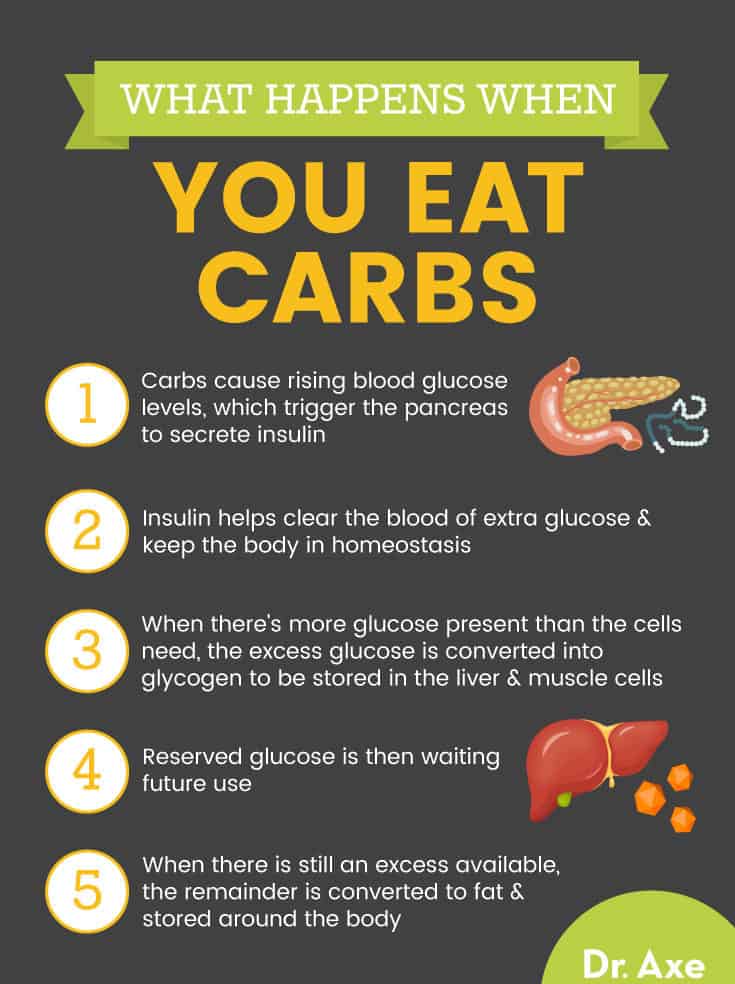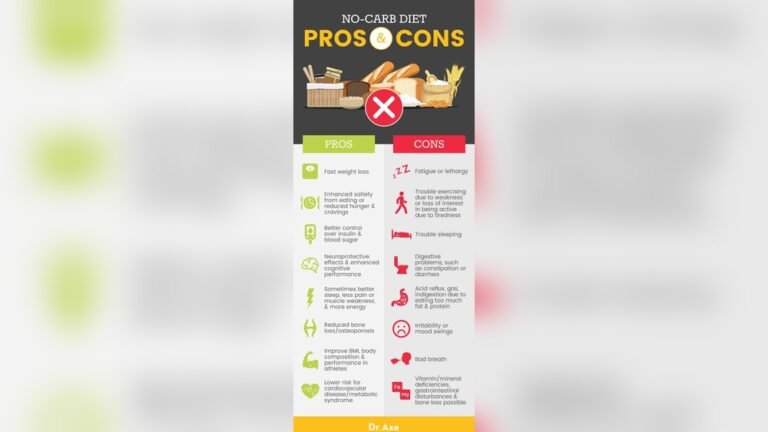Are you thinking about going on a no carb diet to lose weight or improve your health? Before you make that big change, it’s important to ask yourself: Is a no carb diet really healthy for your body?
Carbohydrates are your body’s main source of energy and cutting them out completely can lead to problems like fatigue, nutrient shortages, and digestive issues. But that doesn’t mean all carbs are bad. In fact, choosing the right kinds of carbs can boost your energy and well-being.
Keep reading to discover what happens when you stop eating carbs, the risks involved, and how you can find a balanced approach that works for you. Your health deserves more than a quick fix—let’s explore the facts together.
Carbs And Energy
Carbohydrates are the body’s main fuel source. They break down into glucose, which powers muscles and the brain. Energy from carbs supports daily activities and keeps the body functioning well.
Without carbs, the body must find other ways to get energy. This can affect how you feel and perform. Understanding carbs’ role helps decide if a no carb diet is healthy.
Role Of Carbohydrates In The Body
Carbohydrates provide quick energy. The body turns carbs into glucose for immediate use. Glucose fuels the brain, nerves, and muscles.
Carbs also help store energy. Extra glucose stores as glycogen in muscles and the liver. This reserve supports physical activity and brain function.
Fiber, a type of carbohydrate, aids digestion. It helps maintain a healthy gut and controls blood sugar levels. Carbs also supply important vitamins and minerals.
Effects Of Carb Elimination On Energy Levels
Removing carbs cuts off the body’s preferred energy source. This often leads to fatigue and weakness. The brain may struggle without enough glucose.
To compensate, the body burns fat and protein for energy. This process is slower and less efficient. It can cause tiredness and poor concentration.
Some people report feeling light-headed or irritable when cutting carbs. Muscle strength can drop as protein breaks down for fuel. Energy levels often improve once the body adapts.

Credit: draxe.com
Nutrient Impact
Removing carbohydrates from your diet can affect nutrient intake significantly. Carbohydrates are not just energy sources; they carry many essential nutrients. Understanding the nutrient impact of a no carb diet helps to evaluate its health effects. This section explores key nutrients lost and the importance of fiber for digestion.
Vitamins And Minerals Lost Without Carbs
Carb-rich foods like fruits and vegetables provide vital vitamins. These include vitamin C, B vitamins, and minerals such as potassium and magnesium. A no carb diet often excludes these foods, causing nutrient gaps. Low intake of these vitamins can weaken the immune system. Lack of minerals may affect heart and muscle function. Deficiencies can also cause fatigue and poor brain function.
Fiber And Digestive Health
Fiber comes mainly from carbohydrate foods like whole grains and vegetables. It helps keep the digestive system healthy and regular. Without enough fiber, constipation and digestive discomfort can occur. Fiber also supports good gut bacteria, which aid digestion and immunity. A diet without carbs may lack enough fiber, leading to long-term digestive problems.
Health Risks Of No Carb Diet
Eliminating carbohydrates entirely from your diet can cause several health risks. Carbohydrates serve as the main energy source for the body. Without them, the body may struggle to perform basic functions effectively. The lack of carbs impacts not only energy levels but also muscle and organ health. Understanding these risks helps make informed decisions about diet choices.
Fatigue And Muscle Breakdown
Carbohydrates provide quick energy for daily activities and brain function. Without enough carbs, the body uses protein from muscles for energy. This process causes muscle loss and weakness. Fatigue becomes common as energy stores run low. Physical performance and mental alertness can also decline. Muscle breakdown affects strength and recovery from exercise.
Long-term Heart And Kidney Concerns
Very low-carb diets often increase intake of fats and proteins, especially from animal sources. This can raise cholesterol and blood pressure levels. Over time, this may increase the risk of heart disease. High protein intake can strain the kidneys, especially in people with pre-existing conditions. The kidneys work harder to filter waste products from protein breakdown. Long-term stress on these organs may lead to damage.
Ketosis Explained
Ketosis is a natural process the body uses for energy. It happens when carb intake is very low. The body switches from using glucose to fat for fuel. This change can affect how you feel and function daily.
Understanding ketosis helps decide if a no carb diet is healthy. It clarifies what happens inside the body during this state.
How The Body Uses Fat For Energy
When carbs are scarce, the body looks for another energy source. It begins to break down stored fat into molecules called ketones. These ketones replace glucose as the main fuel. The brain, muscles, and organs start using ketones to work properly.
This process helps reduce fat stores in the body. It is the basis of many low-carb and ketogenic diets.
Potential Side Effects Of Ketosis
Entering ketosis can cause side effects. People may feel tired or weak at first. This is called the “keto flu.” Symptoms include headache, dizziness, and nausea. These usually last a few days.
Long-term ketosis may cause constipation or bad breath. It might also lead to nutrient shortages. Not everyone feels good on a no carb diet. Careful monitoring is important.
Better Carb Choices
Choosing the right carbohydrates is key to a healthy diet. Not all carbs affect your body the same way. Some provide steady energy and nutrients. Others cause quick spikes and crashes in blood sugar. Understanding better carb choices helps you feel better and stay healthy.
Complex Vs. Refined Carbohydrates
Complex carbohydrates come from foods like whole grains, beans, and vegetables. They have fiber, vitamins, and minerals. These carbs digest slowly, giving you long-lasting energy.
Refined carbohydrates come from processed foods like white bread and sweets. They lose fiber and nutrients during processing. These carbs digest quickly, causing blood sugar spikes and crashes. Eating too many refined carbs can lead to health problems.
Sources Of Healthy Carbs
Healthy carbs come from natural, whole foods. Examples include oats, brown rice, quinoa, and barley. Fruits like apples, berries, and oranges also provide good carbs. Vegetables such as sweet potatoes, carrots, and leafy greens add fiber and nutrients. Beans and lentils offer protein and carbs together.
Choosing these sources helps keep energy steady and supports digestion. They also provide vitamins and minerals your body needs daily.
Managing Carb Intake
Managing carbohydrate intake plays a crucial role in maintaining a balanced and healthy diet. Rather than cutting out carbs completely, it is better to control the types and amounts consumed. This approach supports steady energy levels and overall well-being. Understanding how to limit certain carbs and maintain hydration helps prevent common side effects of low-carb diets.
Limiting Sugary And Processed Foods
Sugary and processed foods cause rapid blood sugar spikes. These spikes lead to energy crashes and increased hunger. Avoiding sweets, sodas, and refined snacks helps keep energy stable. Focus on whole foods like vegetables, fruits, and whole grains. These provide fiber and nutrients without causing sharp sugar rises. Reducing processed carbs lowers the risk of weight gain and chronic diseases.
Hydration And Electrolyte Balance
Low-carb diets often increase water loss from the body. This can lead to dehydration and electrolyte imbalances. Drinking enough water is essential to stay hydrated. Electrolytes like sodium, potassium, and magnesium must be replenished. Including foods rich in these minerals or using supplements can help. Proper hydration and electrolyte balance support muscle function and prevent fatigue.
Professional Guidance
Seeking professional guidance is vital before starting a no carb diet. Experts help avoid health risks and ensure balanced nutrition. Their advice supports safe and effective dietary changes.
Consulting Healthcare Providers
Healthcare providers review your medical history and current health status. They identify any conditions that may be affected by carb restriction. Providers offer personalized advice on diet safety and adjustments. Regular check-ups help monitor your body’s response to the diet.
Tailoring Diet To Individual Needs
Each person’s body reacts differently to a no carb diet. Professionals customize meal plans based on age, activity level, and health goals. They help include essential nutrients while minimizing side effects. Tailored diets improve success and reduce health risks over time.

Credit: www.healthline.com

Credit: www.healthline.com
Conclusion
A no carb diet is not healthy for most people. Carbohydrates provide energy and important nutrients. Avoiding all carbs can cause tiredness and digestive problems. Choosing healthy carbs like fruits and vegetables is better. Balance and variety help your body work well.
Always talk to a doctor before big diet changes. Small, smart choices make a lasting difference.


